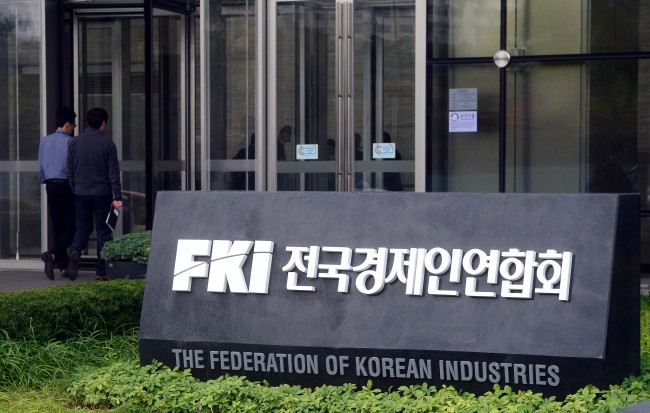Big 4 chaebol groups seek to rebuild FKI
Samsung, SK, Hyundai, LG likely to rejoin disgraced business lobby, join forces for its recovery
By Park Han-naPublished : Aug. 21, 2023 - 17:23

South Korea’s top four chaebol groups -- Samsung, SK, Hyundai Motor and LG -- are likely to rejoin the Federation of Korean Industries, the disgraced business lobby group that has remained practically defunct for years following the revelation of its role in a massive influence-peddling scandal in 2016.
According to industry sources on Monday, key affiliates of the nation’s top conglomerates recently held board meetings to approve them rejoining the FKI.
The latest decision comes after Samsung’s compliance committee on Friday recommended that the group return to the FKI on the condition of “immediate withdrawal in the event of political collusion.” On Monday, key affiliates including Samsung Electronics, Samsung SDI, Samsung Life, Samsung Fire & Marine Insurance and Samsung Securities held board meetings to discuss the issue.
If Samsung returns to the FKI, it would bring to an end its absence of 6 1/2 years, since its withdrawal in February 2017.
Sources said the remaining three groups were also finalizing discussions on their possible reentry into the group later in the day. Company officials, however, declined to confirm, citing the sensitivity of the issue.
The FKI is scheduled to hold a general gathering Tuesday morning. The top four’s reentry is likely to be announced during a press conference after the meeting.
Bringing the four major conglomerates back to its membership ranks is the last piece of the puzzle that the FKI is seeking as part of its self-reform measures aimed at a transformation into an economic think tank and to attract new members.
"The four major groups have a lot to contribute to the operation of the FKI. … Above all, they will naturally monitor and supervise whether they are operating properly," Sungkyunkwan University law school professor Choi June-sun said.
Established in 1961 by the late Samsung founder Lee Byung-chul, the FKI had been Korea's largest and most influential business group, serving as a platform to facilitate official communication with the government and political circles.
The FKI’s reputation has sharply declined for being the nexus for close ties between government and big business, and the withdrawal of the four conglomerates led to an exodus of members.
It once boasted membership of some 640 firms, but that has currently been reduced to 420. Over the past years, its leadership role among business lobby groups has been usurped by the Korea Chamber of Commerce and Industry, which is headed by SK Group Chairman Chey Tae-won.
At Tuesday's meeting, the FKI will seek board members' approval of its plan to merge with the Korea Economic Research Institute, an FKI-affiliated think tank, in a bid to repair its reputation that was tainted by its role in the high-profile scandal that ended up with the impeachment and ousting of former President Park Geun-hye. The group will also vote on the selection of its new chairperson as Poongsan Chairman Ryu Jin.
Earlier this month, Ryu was selected as the sole candidate in recognition of his extensive "experience, knowledge and network on a global stage," which is in line with the group's goal to be promoted to a global think tank and become a pivotal organization.
In May, the FKI announced its reform plan, focusing on “a break from the past” and its will to be reborn as a think tank-cum-business lobby group. It also decided to change its Korean name to that which was used when it was first established 62 years ago, although its English name will remain unchanged as the Federation of Korean Industries.
“The organization has only focused on its relationship with the government, rather than with the public community, and failed to keep up with societal changes,” said Kim Byong-joon, the FKI’s acting chairman, at a press conference.
Posco, which is the nation’s fifth-largest conglomerate and not a member of the Korea Economic Research Institute, is considering rejoining the FKI following a request from the business group.
The group is also expected to accept EcoPro, a secondary battery company that recently submitted an application for membership, according to sources.
The FKI is additionally considering the expansion of its executive committee, which now comprises 11 chairpersons of corporations, to include young entrepreneurs from new industries such as artificial intelligence, entertainment and financial technology.






![[Weekender] How DDP emerged as an icon of Seoul](http://res.heraldm.com/phpwas/restmb_idxmake.php?idx=644&simg=/content/image/2024/04/25/20240425050915_0.jpg&u=)



![[KH Explains] No more 'Michael' at Kakao Games](http://res.heraldm.com/phpwas/restmb_idxmake.php?idx=644&simg=/content/image/2024/04/28/20240428050183_0.jpg&u=20240428180321)
![[Music in drama] An ode to childhood trauma](http://res.heraldm.com/phpwas/restmb_idxmake.php?idx=644&simg=/content/image/2024/04/25/20240425050929_0.jpg&u=)






![[Herald Interview] Mistakes turn into blessings in street performance, director says](http://res.heraldm.com/phpwas/restmb_idxmake.php?idx=652&simg=/content/image/2024/04/28/20240428050150_0.jpg&u=20240428174656)
